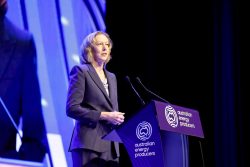Welcome everyone to the 2024 Australian Energy Producers Conference and welcome to Perth.
I'd like to begin by acknowledging the Whadjuk people of the Noongar nation as the traditional custodians of the land upon which we are meeting today.
I would like to thank the Whadjuk people for the wisdom they continue to share about this ancient country and I pay my respects to their Elders past and present.
I extend my respect to Aboriginal and Torres Strait Islander people here today and the First Nations people in the communities where our industry lives and works.
I'm very pleased to be here, delivering my second speech as Chair.
In the year since we gathered in Adelaide, our industry has made some great progress.
We continue to take forward major nation-building gas projects that will supply our customers at home and abroad for decades to come.
And Australian Energy Producers members have stepped up with new commitments to deliver domestic supply to both the WA and east coast markets, responding constructively as governments continue to look to our industry for energy security.

We are doing this as the world emerges from what the Prime Minister Anthony Albanese has accurately called the most significant global energy crisis in 50 years.
The fallout has been massive.
And the volatility is not over.
The horrific conflicts in Ukraine and the Middle East are continuing to impact oil and gas markets.
It is instability absolutely nobody wants.
But it does underline the importance of what we, as energy producers, offer our customers.
They know they can rely on us to deliver safe and affordable energy to heat homes, and power industry, energy that underwrites economic growth.
But rightly, we must now provide this service while also addressing the vital challenge of climate change.
We know this will require a mix of technology and energy solutions beyond our core business of oil and gas.
This brings me neatly to our name change, announced last September.
This new name of our industry association, Australian Energy Producers, reflects the evolution of our industry.

We are now exploring beyond traditional energy sources into new horizons, including hydrogen and carbon capture, utilisation and storage.
We are rising to the occasion and embracing the opportunities that demand for lower-carbon energy brings.
And we are doing this while continuing to provide jobs and contribute to economic prosperity in the communities we operate in.
Across Australia, the gas industry directly supports more than 80,000 jobs and contributed $84 billion to the economy in 2021-2022.
This financial year the industry is on track to pay more than $17 billion in tax and royalties to state and federal governments.
We should be extremely proud of this enormous contribution.
This year's Australian Energy Producers conference theme, Delivering the New Energy Economy reflects the critical part our industry has to play in Australia's future prosperity.
And I don't just mean by producing new sources of energy.
Gas can play a key role in the energy transition too.
Why?
Because when used to generate electricity, gas typically produces half the life cycle emissions of coal.
And gas can provide back-up support for electricity grids powered by renewables and batteries.
The Federal Government released its Future Gas Strategy earlier this month.
On behalf of our members, I welcome the clear statements it makes about the critical role gas plays in Australia's economy and will continue to play in the future.
These include: that gas provides skilled, well-paid jobs, particularly in regional Australia; that Australia needs gas to reach net zero under all credible scenarios and that gas will ensure Australia continues to make things like bricks and glass and the fertiliser farmers need to grow our food.
There's another key point the Strategy makes that I really want to emphasise – that new sources of gas will be needed to meet demand during the energy transition.
We have a great example of the role gas will play in the transition here in WA.
You may have read that BHP expects its local iron ore operations will need roughly seven times the amount of power it uses now by 2040.
The extra generation will be used to produce iron ore but it will also be needed for decarbonisation projects, including the electrification of BHP's rail and mining fleet.
To achieve this transformation, the company is planning to expand the use of gas-fired power at its Yarnima Power Station near Newman.

BHP estimates displacing diesel electricity generation with gas will avoid more than three million tonnes of carbon dioxide equivalent Scope 1 emissions between 2027 and 2052.
That's a huge emissions saving and it would be driven by gas.
This real-life case study highlights one of the key findings of a report Australian Energy Producers commissioned to inform its Future Gas Strategy submission.
That report, by Ernst and Young, found that 26 years from now – when, hopefully, we are living in a net zero world, there will still be a need for gas.
Ernst and Young considered a range of emissions scenarios, including ones from the International Energy Agency and the Intergovernmental Panel on Climate Change.
While almost all net zero scenarios showed gas demand declining, as I said, they also showed a need for it in 2050.
The report also highlighted the Australian Energy Market Operator's view that as coal fired power stations retire and more renewable energy comes into power grids, gas will become an increasingly important source of back-up power.
It's a position shared by the Australian Competition and Consumer Commission.
I want to go back now to that point the Future Gas Strategy makes about new sources of gas supply being needed to meet demand during the transition – demand from major economies in our region, as they seek to reduce reliance on coal and achieve their net zero pathways – and demand to service our own needs right here at home.
This is a challenge Australia faces this decade.
As the Future Gas Strategy points out, without action, the east coast of Australia faces projected shortfalls by 2028 and the west coast by 2030.

These outcomes would likely increase volatility and drive-up prices for households and businesses already battling inflationary and cost of living pressures.
So I am pleased the Government is talking about solutions.
To my mind the best solution to a shortage is always supply, supply, supply.
We as industry are ready to roll up our sleeves and work with the Commonwealth to achieve this.
And we welcome acknowledgment in the Strategy that we'll need the right regulatory settings to do so.
Indeed, the success of the Strategy will be measured by whether it delivers policy reforms that address the barriers to new gas supply and investment.
As an industry, we are pleased with the development in Canberra last week that has given us certainty on the Petroleum Resource Rent Tax.
This helps us make future investment decisions.
But it has come at the expense of addressing the ambiguity in the consultation process for offshore approvals.
Leaving this issue unresolved makes the timely development of new energy supply more difficult.
And the industry stands ready to work with the Government to progress these necessary reforms as soon as possible.
Delivering the new energy economy will require a scaling up of carbon management solutions.
So it is pleasing to hear the Government's strong endorsement of the role carbon capture and storage can play in reducing the emissions intensity of natural gas production and the potential for CCS to reduce emissions in hard to abate industrial processes like steel and cement manufacturing.
We know this technology works and we know it can deliver both environmental and economic benefits.
Our trading partners want us to support their decarbonisation efforts by storing carbon here in Australia, consistent with Federal Parliament's recent ratification of amendments to the London Protocol.
It is an opportunity Australia must pursue and it's great to see funding in the Federal Budget to support it.
May I also acknowledge the Federal Coalition's ongoing support for our industry, including here in Western Australia.
As the Opposition Leader Peter Dutton said in his budget in reply speech, a turbo-charged Western Australian economy means more national prosperity.
And I thank him for his commitment to streamlining approval processes.
I would also like to call out the Western Australian Government's strong advocacy for the resources industry.
I am sure that being here on the ground and seeing the ore trains fly by when you're stopped at a rail crossing in the Pilbara, or watching an LNG tanker depart on its long journey, makes it easier to understand our needs and perspectives but the WA Government really has shown leadership.
For example, I'd like to share a key quote from Premier Cook at the WA Energy Transition Summit last year.
Reflecting on the role of gas as a transition fuel he said, "the benefits of WA helping other high-emission countries to decarbonise far outstrips the benefits of decarbonising our own economy."
The Premier's words show a clear-eyed understanding of the complex, global nature, of the climate challenge.
And they reflect the pragmatic support that we'll need to fulfil the title of today's conference and deliver the new energy economy.
With a federal election and various state polls on the horizon I encourage all sides of politics to remain focused on these longer-term benefits.
I also firmly believe we need a reset in the energy and climate conversation.
And it must be based on the science of climate change.
When we as industry leaders speak, we are scrupulously careful to do so accurately and transparently.
And that is as it should be - society deserves the truth.
I believe critics of our industry would do well to take a similar approach.
To this end, I commend Minister King for her unequivocal statement that the Future Gas Strategy is "based on facts and data, not ideology and wishful thinking".
Because ensuring our industry can continue to supply safe, reliable and affordable energy is not just in our industry's interest - it is in the national interest.
As industry, we must work constructively with government and offer practical solutions to the challenges the energy transition brings.
We need to do this so we can keep powering human progress and improving lives.
It is a good and noble cause.
And I encourage everyone here to be proud of the role you are playing as we strive to achieve it.
Thank you.






